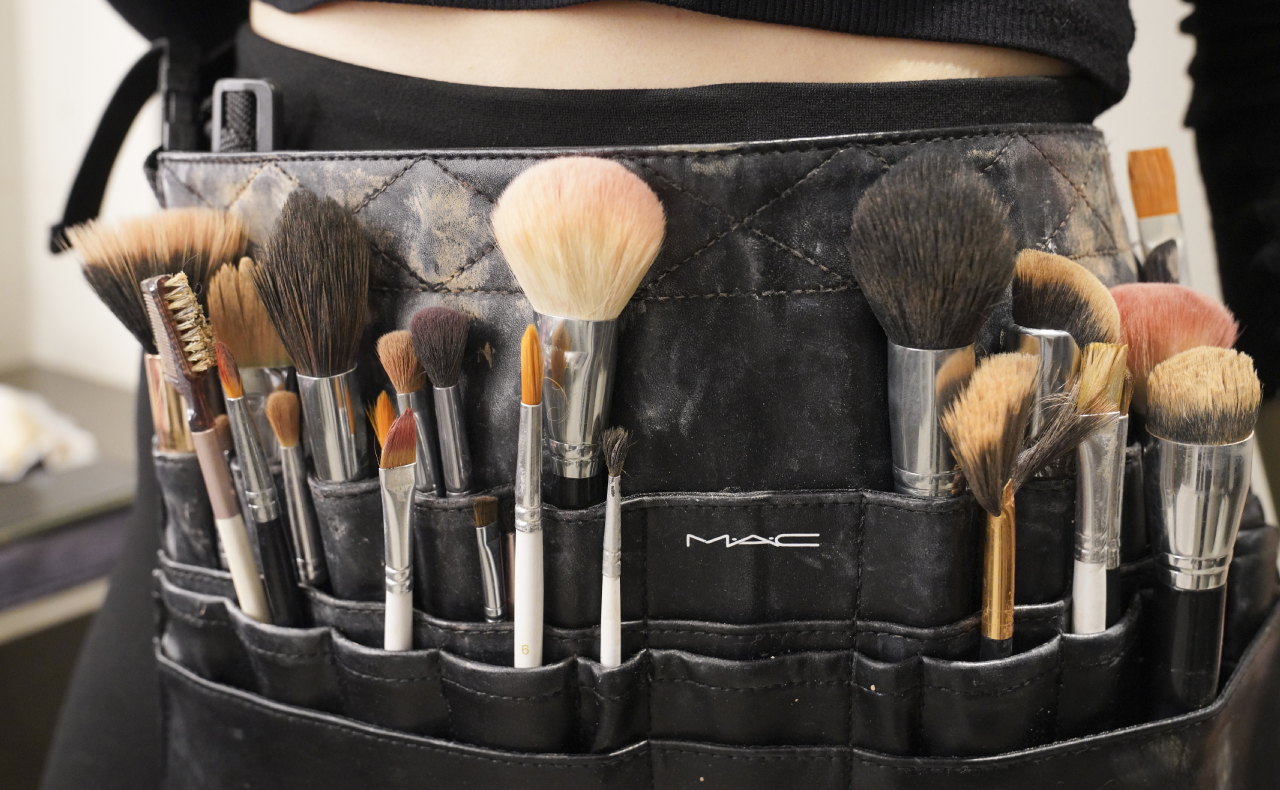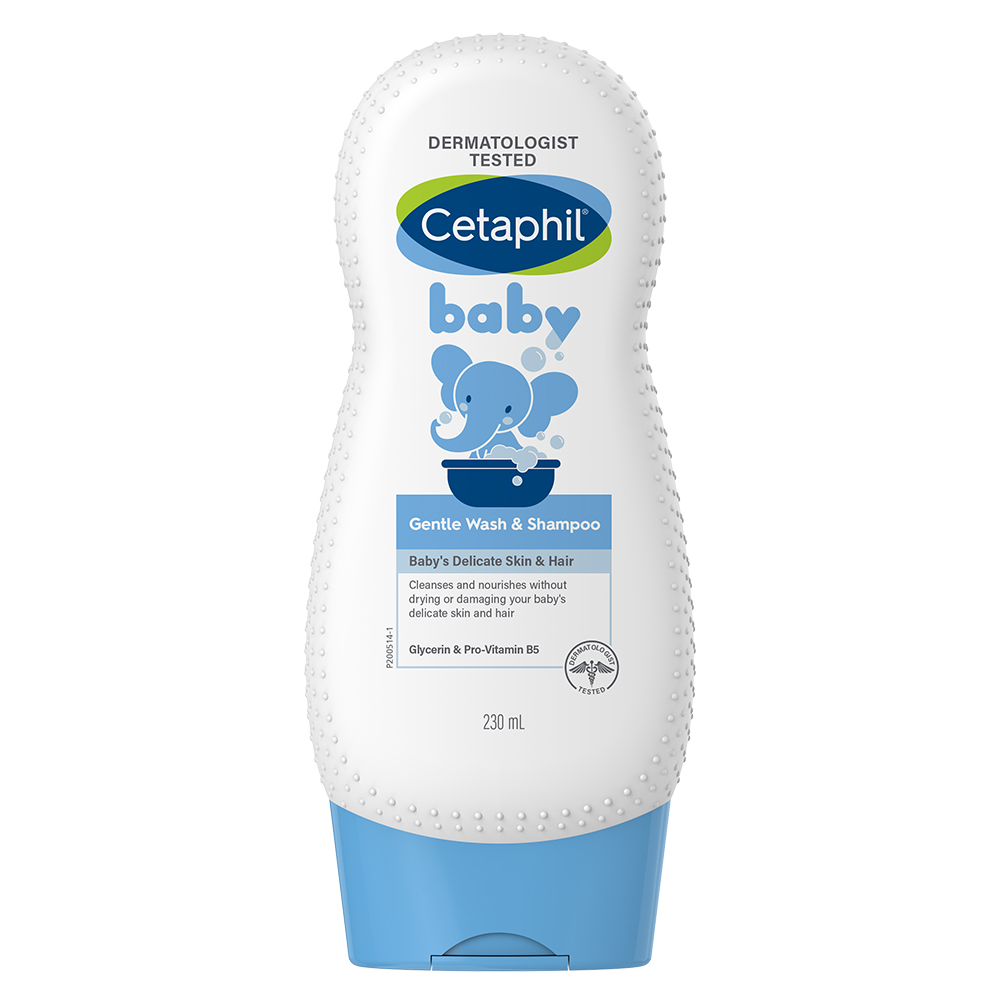Keeping your makeup brushes clean is no joke. Of course, there’s the obvious benefit of removing residual product; have you ever tried achieving a bronzed lid with the same brush you used on your smokey eye? Yeah, it’s tragic. However, there is a far more serious and far more disgusting reason to keep your brushes clean: to prevent breakouts, acne and fungal infections caused by a build-up of bacteria.
2024’s Top 3 Products To Clean Makeup Brushes:
- M.A.C Cosmetics Brush Cleanser, $33, Myer
- EcoTools Makeup Brush Shampoo, $15.99, Oz Hair and Beauty
- Isocol Rubbing Alcohol Antiseptic, $10.95, Healthy Life
Best way to clean makeup brushes
M.A.C Cosmetics Brush Cleanser

When it comes to makeup, M.A.C is close to the holy grail. It’s created for professional makeup artists but still formulated in ways that us regular folk can master. It’s no wonder that from lipstick to eyeshadow, it’s a brand we trust. So, of course when it comes to cleaning our makeup covered brushes they’ve got a clever cleansing solution. The liquid is designed to not only cleanse away all the grime from your brushes and makes sure they’re thoroughly disinfected. But it also works in a clever conditioning aspect. Fresh smelling, and able to extend the life of your brush, this quick-drying cleanser will have you back to applying your makeup in no time.
Want to read more? Read M.A.C Cosmetics Brush Cleanser Reviews here…
Key Features:
- Extends life of brushes
- Brush-conditioning benefits
- Long list of ‘free from’ ingredients
Available at:
- $33 from Myer
- $33 from David Jones
- $33 from M.A.C Cosmetics
EcoTools Makeup Brush Shampoo

This environmentally-conscious shampoo is a weekly refresh for your brush bristles. Because brush hair needs some TLC too. And if you needed an extra push in the brush cleaning direction, cleansing your brushes will help you to apply your makeup better. This seriously gentle shampoo is backed by dermatologists and made to be totally hypoallergenic. Your skin will be thanking you for this.
Want to read more? Read EcoTools Makeup Brush Shampoo Reviews here…
Key Features:
- Plant-based formula
- Bottle is made from 40 per cent PCR
- Hypo-allergetic
Available at:
- $15.99 from Oz Hair and Beauty
- $15.99 from Priceline
- $17 at Big W
Isocol Rubbing Alcohol Antiseptic

For the sake of bump-prone skin and antibacterial peace of mind this alcohol antiseptic will make sure that any acne-causing makeup buildup breakouts will be put to rest. The bacteria-busting antiseptic is a fantastic brush double-cleanse (if you will), although it’s still mighty powerful on its own. Its goal? Giving you the ultimate peace of mind in the fight to say ‘see ya’ to adult acne (we’ve all been there). And the best thing about this little green bottle? You probably already have one laying around the house! The quick-drying antiseptic kills 99 per cent of germs and can be used for a wide range of tasks. Who doesn’t love a fuss-free beauty product?
Want to read more? Read Isocol Rubbing Alcohol Antiseptic Reviews here…
Key Features:
- Kills 99 per cent of germs
- Multi-purpose household item
- Antibacterial properties
Available at:
- $10.95 (usually $12.99) from Healthy Life
- $11.50 (usually $13.50) from Woolworths
- $10.96 (usually $13.49) from Chemist Warehouse
Real Techniques Brush + Sponge Cleansing Gel

Designed by the people that know how to make gooood brushes for the best brush cleansing possibilities. With countless hours of lab testing, and dermatologist backing this cleanser has been designed to gently lift away any build-up and germs leaving behind a renewed brush. When you wash your brushes with this vegan cleansing gel, you’ll feel like you’ve come away with an all new set of ultra-clean brushes. Bonus: even though it’s a deep, thorough clean, it’s super quick to clean and rinse. So, if you’re after good clean fun, you’ve come to the right place.
Want to read more? Read Real Techniques Brush + Sponge Cleansing Gel Reviews here…
Key Features:
- Cruelty-free
- Vegan formulation
- Alcohol free
Available at:
- $19.99 from Adore Beauty
- $15.99 (usually $19.99) from Oz Hair and Beauty
- $15.99 (usually $19.99) from Priceline
philosophy Purity Made Simple 3-in-1 Cleanser

If you want to take your brush cleansing knowledge from one of the makeup artist superstars, then there’s no better place to look than Mario Dedivanovic. Mario opts for a gentle cleanser. Because if it’s gentle enough for your skin and still powerful enough to remove makeup then you’re onto a brush cleansing winner. His fave cleanser? The wonderfully gentle, fragrance-free philosophy Simple Cleanser. With skin (and brush) nourishing oils you’ll want to keep this on hand (well, face) for your usual cleansing routine too.
Key Features:
- Fragrance-free
- Formulated with natural oils
- Sensitive-skin formula
Available at:
- $45 from Adore Beauty
- $45 from RY
- $45 from Look Fantastic
How often should you wash your makeup brushes?
Every day? Once a week? Twice a week? Once a month? Although there is no definitive answer, dermatologists recommend cleaning your makeup brushes on a regular basis. If your brushes or sponges show visible signs of makeup residue or are used around your eyes, washing them at least once a week is a good idea.
Hygiene reasons aside, do you ever feel as though your makeup just looks better when you’re using a new brush? Well, there’s a reason for this. Makeup that is applied with a dirty brush or sponge will look dirty, streaky, and difficult to blend out.
How to wash makeup brushes?
- Wet brush bristles or sponge with warm water
- Place cleanser or shampoo into the palm of your hand
- Dip your brush into the cleanser and swirl around in your palm
- Rinse brush bristles with warm water
- Remould brush tips back into their original shape (do not squeeze too hard or use a towel as this can cause damage to the brush)
- Lay brushes flat with the bristles hanging over the edge of a counter. Do not allow the brushes to dry against a towel, as this can cause mould. Do not dry brushes standing up as this can change the shape of the brush. And, do not use a hair dryer to speed up the drying process!
Can you use shampoo to clean makeup brushes?
A gentle, soap-free or children’s shampoo like the Cetaphil Baby Gentle Wash & Shampoo ($15.50, Woolworths) is safe for use on a makeup brush. Avoid using your regular shampoo as it can be too strong and may damage the bristles on your brush.
How often do you wash your makeup brushes? What are your best tips?







Fantastic post!! I never thought about reshaping the brush, no wander my brushes have changed shape. and I actually use soap on some of my brushes, hmmm thats maybe why theyve changed?
righht
I must admit that I am usually overwhelmed by all the different make up brushes one can buy. which is which and what should it be used for. SO many to choose from.
Me too -I know the feeling
jnjljnnkn
Gosh, don’t remember last time I used one!
No where near as often as I should.
we can all be guilty of that
so true
ahah yes
I clean them frequently and as suggested, a very helpful read thanks bh!.
Good on you -I think you are very wise
exactly
I use a mild detergent and seems to be good
Thanks for tip no 5 I knew the rest but I would leave them on a towel to dry won’t be now.
Yes that is a good tip
I tend to use antibacterial hand soap to clean my brushes
right !!!!!
This is a really informative post. I like the idea of using a cleanser to wash brushes with.
so trueee
I use liquid hand wash and shampoos that I don’t like to clean my brushes.
Good idea.
bjxjxjxx
Thanks for the reminder BH, must wash my brushes this week.
Good tips. I like to finish off my brushes with a spray of isopropyl alcohol
yess nice and easy
I wash my brushes every week.
I wash regularly with a mild shampoo and hang them to dry with the bristles facing downwards by wrapping an elastic band around the brush handle and the base of a wire coathanger. The coathanger is then hung near an open window to speed up the drying process.
I usually just clean them with handwash
Really useful article
I’m diligent about cleaning my brushes. I usually use whatever hand wash or cake of soap is on the go.
I just use Daiso brush cleanser. Cheap and does the job well.
it’s the only thing I use! So good.
I haven’t heard of this one
so true!!!
Interesting and so important to do this correctly.
Fantastic post. Thanks for sharing such a wonderful and useful advice and information you shared with us. I like liquid handwash and shampoos. https://www.prepaidgiftbalance.vip
I wash mine all the time with pump soap.
love this !!!
A great reminder to keep our brushes clean. I do my eye makeup brushes regularly and also my hair brushes they get really yuk from all the products I use.
Thanks Beautyheaven, I needed this reminder to clean my sponge and brushes. Such a helpful article!
I use Cinema Secrets & Daiso brush cleaner to clean my brushes every week as good make-up brushes are expensive so it pays to take good care of them which in turn is good for my skin also.
I love the Daiso brush cleaner, so affordable too
Great post! oops, I’ve been using micellar water.
In between spot cleans? It’s either a full clean or nothing for me lol
I don’t use them often so don’t clean them often, I probably should though.
great article. I wash mine at least once a week, i normally use a mild detergent to kill the bacteria.
I just always use one of my cleansers which seem to work well with my brushes and sponges. It’s a chore I hate doing but try to do once a week, depending how busy I am.
Hi
the process which you posted here related to clean makeup brushes is really amazing. I have tried it also and result is great. Receiptify Spotify
I just use a paraben free gentle non toxic handwash or facewash.
I must admit to never cleaning my brushes. They dont seem to get to dirty?
I wash my makeup brushes everytime I use them
I use gentle hand soap to clean my brushes, honestly I don’t see the point to buy a special product for this.
I use hair shampoo and this seems to work ok
Good reminder and good article
Nice techniques